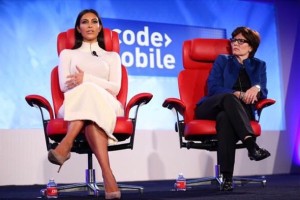This article was originally published in TechCrunch.
 The re/code mobile conference took place a couple of weeks ago, and among the speakers discussing the trends in tech were YouTube’s Susan Wojcicki, Instagram’s Kevin Systorm, Kim Kardashian West and… “Wait, what? Kim Kardashian is a tech expert now? Seriously???”
The re/code mobile conference took place a couple of weeks ago, and among the speakers discussing the trends in tech were YouTube’s Susan Wojcicki, Instagram’s Kevin Systorm, Kim Kardashian West and… “Wait, what? Kim Kardashian is a tech expert now? Seriously???”
Many on Twitter were not convinced, and even Kara Swisher had to kickoff the interviewsomewhat apologetic going over Kardashian West’s impressive social footprint: 21 million Instagram followers; 25.2 million Twitter followers; and her iPhone game made her millions in the last year (and she does it all via a BlackBerry). If that’s not a savvy mobile tech powerhouse then what is?
Kardashian West is much more than a reality-show star at this point but in a way the reason she is a pioneer in using social media and developing her media brand, stems from the fact that she first got famous on reality TV.
Reality stars are good examples of artists that have massive appeal, great brand recognition and (for some) the talent to have successful careers after the show ends. However, when they are reality stars, they have no leverage over the show producers. If their show gets dropped, if their persona gets twisted in the editing room, their career could end before it even really started.
That is why social media outlets are key for these artists; they allow them to connect directly to their audiences. If E! drops Keeping Up with the Kardashians tomorrow, Kim will still be famous, because every time she’s online, she can connect with an audience more than twice the size of the average viewership of an episode of The Voice on NBC. Having this direct channel to her fans, she can now easily branch out to other ventures, like her mobile app.
Another social media powerhouse is Ellen DeGeneres. Ellen has about 33 million Twitter followers and about 100 million YouTube views per month. As a TV star, having her own video space seems vital. She recently launched ellentube, a website with an accompanying slick mobile app that allows fans to view her show’s highlights, additional clips and even upload their own cute home videos.
So what are the main reasons to build such a unique brand experience and go, in Ellen’s case, beyond YouTube?
It’s about building a community; videos uploaded to ellentube are moderated, which is not a simple feat. It surely requires quite an operation in the backend. However, creating a safe environment is key for Ellen’s brand. If she is going to throw all her weight behind this, she must make sure her fans feel completely at home there. This feeling is going to encourage them to come back and participate. This environment, which marketers usually refer to as “brand safety,” is key to attracting large sponsors that usually worry about having their pre-roll ads before a cute kitten video. So if Ellen can make both her audience and her advertisers comfortable, this site has enormous potential.
It’s about owning the data. In her re/code interview, Kardashian West called her Twitter followers “an amazing focus group.” The ability to get direct, unfiltered responses from fans is priceless. Kardashian West often uses it to consult with her fans about which restaurant to go to, but she can also use that as a focus group when making business decisions. Netflix is using its fan base for that and HBO is looking to do the same.
In Ellen’s case, her producers can now make a calculated decision to air a user-generated video from the site, based on how many people liked it on ellentube.
These examples boil down to being able to call your own shots. Creating your own video site or gaming app isn’t easy; it takes investment, time and expertise. However, if you team up with the right people, the potential upside is enormous. It’s all about maintaining creative control.
These celebrities know their audiences better than any video or gaming expert out there. So if they are independent and can create their own experiences — as well as have a direct channel to their fans — their possibilities in the digital space are endless.
